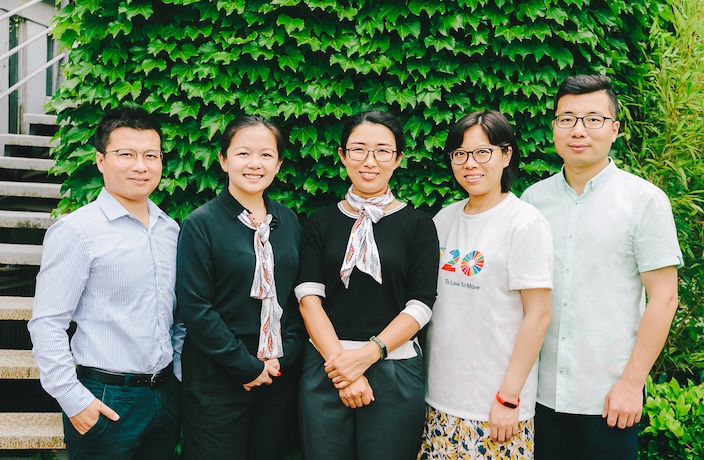With a background in hospitality and travel management in large corporations, entrepreneur Jayne Goh has turned her attention to sustainable development in the traditional textile industry, advocating recycled polyester products through P.E.T. – Plastic Ecological Transformation.
How did P.E.T. come about?
P.E.T. – Plastic Ecological Transformation – was founded in July 2017 by Jane Zhao, a post-‘80s mother of two and fashion manufacturing industry veteran. Perturbed by the state of pollution in China that her children will be inheriting, she decided to tackle the root problem of raw material. Combining the traditional textile industry with sustainable development, it not only meets the needs of the modern age, but also protects the “green rivers and green mountains” for future generations.
Tell us about what you do.
P.E.T. business is in B2B design and manufacturing of recycled polyester products. From corporate gifts to staff uniforms, as long as it’s made from polyester, we can switch it to recycled polyester for you. 60% of the world’s fabrics are made of polyester; you’ll be surprised to see how much you use in your company. P.E.T. reduces environmental pollution from the root by using 100% rPET, local, certified and traceable material for all its products. This material, which is technically known as recycled Polyethylene Terephthalate, comes from recycled plastic bottles and can be transformed into many styles of fabrics.

The P.E.T. cycle
What problems do you face?
Many times it is easy to recognize the problem, but difficult for companies to spend time and money to research and develop solutions, especially if it is not part of their core business. For example, it is common sense for fashion brands to switch from virgin polyester (PET) to recycled polyester (rPET), but it might never have crossed the mind of a hotelier, even though the hospitality industry uses a lot of fabrics. As with all large corporations, when the ship is big, it is harder to turn, be nimble and implement change. As such, I hope to become a solution provider to help in this change.
What are your most popular products?
Our products come in 3 categories: corporate gifts (t-shirts, athleisure wear, canvas bags, silk scarves, etc.); industrial products (product packaging, staff and school uniforms); and interior furnishing (cushion covers, aprons, tablecloths). Current favorites are our iconic rPET keychain bags and rPET silk scarves (both made from three recycled bottles).

Jayne Goh (second from the left) with the P.E.T. team
What sort of interest are you getting from companies?
We work closely with many multi-national companies who have their own sustainability goals. One such company is The Coca-Cola Company, who has a global sustainability commitment to collect and recycle the equivalent of every bottle or can it sells by 2030. Many of their beverages in China use PET packaging, and hence we work closely to find innovative ways to use its recycled form.
On World Environment Day this year, we launched a limited-edition pouch with Coca-Cola – each made from three recycled plastic bottles. The design was inspired by the United Nations 17 Sustainable Development Goals (SDG), where the iconic SDG wheel was hand-sewn by stay-at-home mothers in Gansu province, as part of Coca-Cola’s poverty alleviation program. This is an example of our joint efforts to create a sustainable supply chain, using not only recycled raw materials, but also helping women who are unable to leave home generate income.

A P.E.T. product
How to Turn a Bottle into Products
STEP 1: BOTTLE PROCESSING
Plastic bottles are collected and sent to waste separation points throughout the city, where they are packed into 2x2 meter cubes. Cubes are then shipped to the factory, where they are manually processed to remove bottle caps and labels.
STEP 2: BOTTLE SHREDS
High grade and qualified bottles are then washed, sterilized and shredded into pieces.
STEP 3: rPET PELLETS
Shreds are melted down into PET Pellets – now they share the same form as virgin plastic pellets.
STEP 4: rPET YARN
Pellets are further melted and pulled into strands and spun into yarn.
STEP 5: rPET FABRIC
Yarn is then shipped to Fabric manufacturing factory to be made into rPET fabric.
STEP 6: rPET CLOTHING
rPET is fabric is bought by fashion houses to make consumer products like clothes and bags.
Contact Jayne at jayne.goh@goodcycle.cn to find out the number of bottles you can save by switching to recycled polyester. Are you a hotelier? A single hotel can save 150,000 bottles per year.
For more information, scan the QR code below.






















0 User Comments